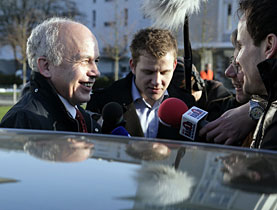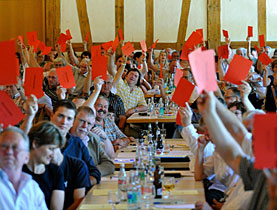Right wing looks set for cabinet comeback

Parliament on Wednesday is due to elect a new cabinet member to replace Defence Minister Samuel Schmid, who announced his resignation last month.
The rightwing Swiss People’s Party – the largest of the four main groups in parliament – is poised to return to the government after one year of self-declared opposition and increasing internal tensions.
The People’s Party is presenting a double ticket for the vacant cabinet seat, with the front-runner being Ueli Maurer, a member of the House of Representatives and former party president.
Ironically he is only his party’s second choice – behind strongman Christoph Blocher. The former justice minister is attempting a comeback after being voted out of office a year ago.
That move, which was seen as a massive blow for one of the most controversial Swiss politicians in recent years, triggered a split within the People’s Party.
But Blocher stands virtually no chance of winning a majority in parliament as the other parties have announced they will not back him.
Equally unlikely is the election of Luc Recordon from the Green Party, who helped mastermind the political upset 12 months ago.
“We want to return to the cabinet and with a typical representative of our party,” said People’s Party parliamentarian Luzi Stamm. He admits that the role of classic opposition group – unusual in Switzerland’s direct democracy – has not been successful.
The three other main parties do not in principle contest the People’s Party claim to the cabinet seat given the long-standing tradition of power sharing among the leading political forces.
Doubts
However, there is scepticism across the political spectrum over the rightwing ticket, and over Maurer as a candidate in particular. Many question his independence of Blocher and criticise his provocative comments and past insults of political opponents.
A group of parliamentarians is working behind the scenes to stop both Blocher and Maurer in their tracks, saying they are equally damaging and divisive for the country.
“Maurer is simply a photocopy of Blocher. As a party president he used to be his hatchet man,” said Andreas Gross of the centre-left Social Democrats. The party announced on Tuesday that they would not be supporting any of the candidates.
The centre-right Christian Democrats meanwhile voted by a slim majority to back Maurer. Blocher failed to gain a single vote within the party.
But observers point out that there are hardly any plausible alternatives, as only a minority in parliament is keen to stage another upset.

More
Direct democracy
Blocher
“It would be difficult for the centre-right in particular to shun Maurer and elect another People’s Party member instead,” said political scientist Georg Lutz of Lausanne University.
“But ultimately there is always some degree of uncertainty in a cabinet election.”
Lutz agrees that Blocher does not stand a chance and is even disputed within his own party, but he is convinced that it will not spell the end for the controversial figure in Swiss politics.
“He is likely to continue to have a decisive role in the party leadership, as a sort of shadow party president.”
Blocher, a multi-billionaire and former businessman, has been a driving force behind the rise of the People’s Party over the past two decades. He is also believed to have bankrolled the group.
“I think it is in the interest of both Blocher and the People’s Party to speed up internal changes,” Lutz said.
Yet as long as Blocher remains the central pillar of the party it is difficult to carry out reforms and bring in new blood, according to the political scientist.
Public interest
There is a high level of public interest in Wednesday’s election – considered one of the highlights of the parliamentary session.
Seats in the visitors’ section have been booked out for a long time and television, radio and online media are running live coverage.
Also on Wednesday, the joint session of the House of Representatives and the Senate will appoint the Swiss president for 2009, a mainly ceremonial post rotated among the seven cabinet members according to seniority.
Finance Minister Hans-Rudolf Merz is set to take over from Interior Minister Pascal Couchepin. Economics Minister Doris Leuthard is likely to be elected vice president.
swissinfo, Urs Geiser

More
Consensus politics and power-sharing
The Swiss cabinet comprises seven members and is elected for a four-year term by parliament. Every minister is elected individually.
The political make-up remained unchanged for more than 40 years with the four main parties – the Radicals, Christian Democrats, Social Democrats and Swiss People’s Party – sharing the seats.
In 2003 the People’s Party won a second seat at the expense of the Christian Democrats.
Last year parliament refused to re-elect a highly controversial People’s Party cabinet minister and chose another member of the party instead, Eveline Widmer-Schlumpf.
As a result the People’s Party excluded Widmer-Schlumpf. Along with sitting cabinet minister, Samuel Schmid, she joined the newly founded breakaway Conservative Democratic Party, which then had two seats in cabinet.
The People’s Party, which won 29% of the vote in the 2007 parliamentary elections, announced it was going into opposition.
Parliament is also due to choose next year’s Swiss president – a mainly ceremonial post which is rotated among the seven cabinet members.
The president chairs government meetings and takes on some representative functions. There are no additional powers to the office. The president retains his/her portfolio.
2009 is the turn of Finance Minister Hans-Rudolf Merz, a member of the centre-right Radical Party.
Merz’s deputy – likely to succeed him in 2010 – is Economics Minister Doris Leuthard of the centre-right Christian Democratic Party.

In compliance with the JTI standards
More: SWI swissinfo.ch certified by the Journalism Trust Initiative













You can find an overview of ongoing debates with our journalists here . Please join us!
If you want to start a conversation about a topic raised in this article or want to report factual errors, email us at english@swissinfo.ch.